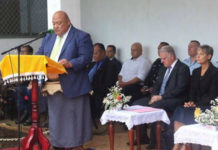Credit: Jared Savage, NZHerald
The so-called “inside man” who helped smuggle 250kg of drugs into New Zealand said he was paid $60,000, a court has heard.
Mosese Laumanu Uele was the final Crown witness to give evidence against Yixin “Lonna” Gan, who is on trial for three counts of importing a Class-B drug and one of possession for supply, following a covert police investigation dubbed Operation Ghost.
The case is about pseudoephedrine, once the active ingredient in New Zealanders’ favourite cold and flu medicines, but now banned as it’s the main ingredient needed to cook methamphetamine.
Pseudoephedrine can be extracted from a cold and flu medicine widely available in China called ContacNT.
A packet costs just a “few dollars” but a “set” of 223g of pink granules sells for around $9000 on the black market in New Zealand.
In opening the Crown case, prosecutor Scott McColgan alleged Gan, a 35-year-old mother of three, had discovered an “almost perfect way” of importing drugs into New Zealand.
She ran a legitimate business shipping food from China to the Pacific Islands, with a short stop in New Zealand.

But because the shipments were shown as goods in transit – and therefore not technically coming through the border – the consignments were not inspected by Customs.
Instead, the shipments were sent to the secure Customs-controlled area at Auckland Airport until they were freighted to the final destination.
Uele – who pleaded guilty and was convicted of importing a Class-B drug for his role – allegedly acted as the “inside man” for Gan through his freight-forwarding company Ezi World Cargo on one occasion.
Uele told the jury he first met Gan in his homeland of Tonga more than 10 years ago.
She was a customer of Ezi World Cargo and Uele explained how he legitimately shipped food produce to the Pacific island kingdom on her behalf.
Asked about three different companies associated with Gan, Uele confirmed he only ever dealt with her directly.
Gan later came to work for him at Ezi World as Uele tried to build business ties with the Chinese community in Tonga.

For one shipment in October 2013, Uele explained how he swapped 20 boxes labelled “starch” inside his Customs-controlled warehouse.
These were put in a van, which he said was supplied by Gan, which he drove to a nearby carpark and left there.
Uele said Gan gave him a SIM card for his phone to make all the arrangements with. He later threw the SIM card away.
Uele denied knowing what was inside the boxes of “starch”. He said he was paid $60,000 in a large brown envelope.
“Did you ask why she paid $60,000 to swap 20 boxes of starch?” asked McColgan.
“It wasn’t my business. My role was to swap boxes and get money. That was my only concern,” Uele replied.
“It was too great…[I was] too greedy.”
Under cross-examination by Gan’s defence lawyer Graeme Newell, Uele denied lying.
“I did get instructions from Lonna to swap boxes.”
Newell asked Uele whether a man called Da Wen Shao – not his client Gan – gave Uele the SIM card and told him to swap the boxes of starch.
Uele said he had never met Shao.
“Are you scared of Da Wen Shao?” asked Newell.
Uele replied: “I don’t know Shao”.
The Operation Ghost detectives followed the van packed by Uele to two Auckland addresses, where they later found 250kg of ContacNT granules.
The trial before Justice Mathew Downs and a jury of six women and six men is expected to end this week.







